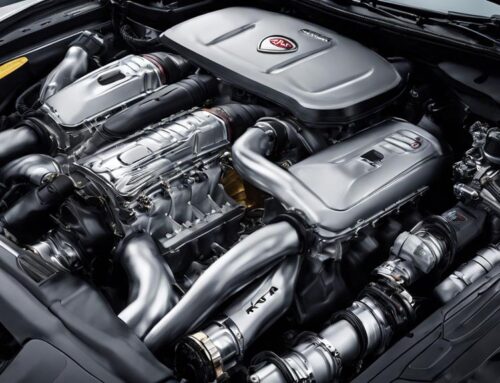To maintain optimum performance of your home security system, regular maintenance is key. Conduct routine checks to catch small issues early and prevent unexpected failures. Make sure to update software and firmware regularly to enhance system reliability. Professional evaluations at least annually help detect hidden problems. Understanding system components and functionalities maximizes protection. Remember to test your system monthly and inspect sensors and cameras quarterly. Also, cleaning lenses and monitoring environmental conditions are essential. Stay on top of battery maintenance and address common issues promptly. Following these steps will keep your security system at its best.
Key Takeaways
- Regularly test alarms and sensors for functionality and responsiveness.
- Keep software and firmware updated to prevent security vulnerabilities.
- Schedule annual professional evaluations for hidden issue detection.
- Clean lenses and sensors for optimal performance and reduced false alarms.
- Replace batteries as needed to maintain device functionality.
Importance of Regular Maintenance
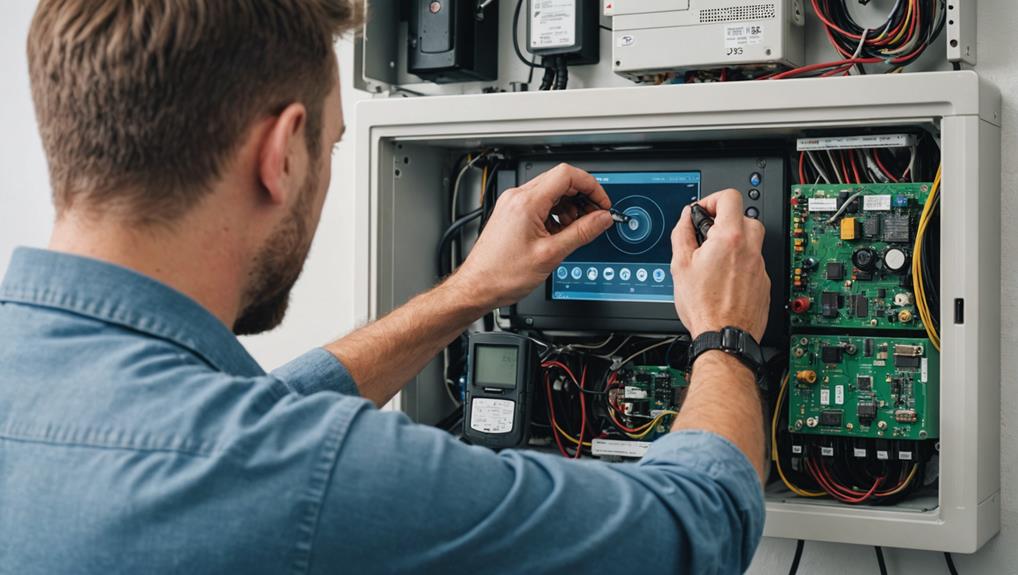
Regular maintenance of your home security system is vital for guaranteeing its proper functioning and reliability. Consistently maintaining your home security system through regular upkeep is essential for its longevity and effectiveness.
By conducting routine checks and inspections, you can identify any minor issues early on, preventing unexpected failures and vulnerabilities that could compromise your safety. This proactive approach not only helps avoid costly repairs or replacements but also extends the lifespan of your security equipment.
Well-maintained security systems provide consistent protection, reducing the chances of false alarms and enhancing overall monitoring efficiency. Additionally, best practices suggest that regularly updating your system's software and firmware can further improve its reliability.
Engaging in regular maintenance fosters peace of mind, knowing that your system is ready to respond to potential threats. To guarantee thorough functionality, it's recommended to have a professional evaluation at least once a year. These assessments can detect hidden issues and further bolster your home security assurance.
Understanding System Components
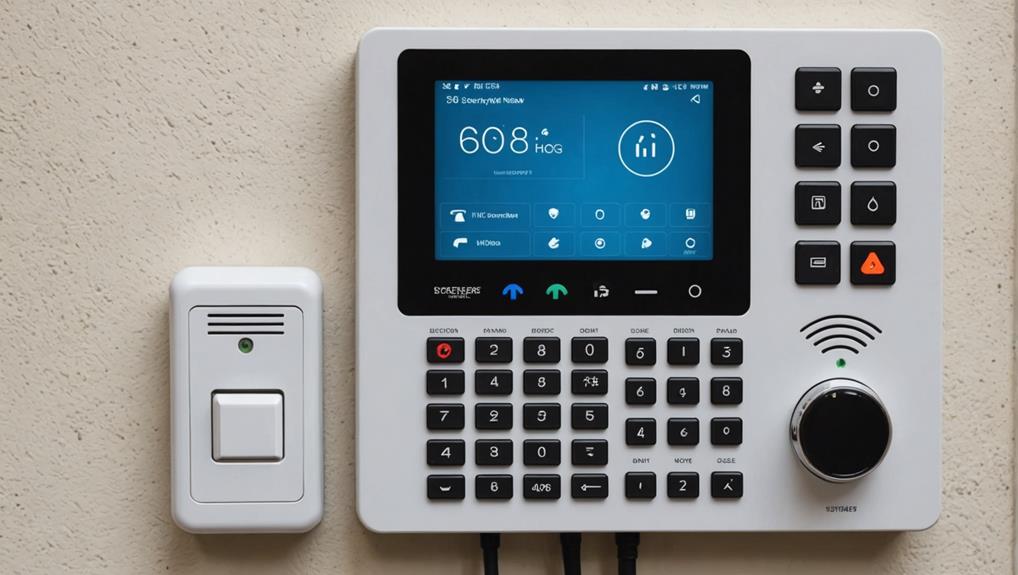
To guarantee your home security system operates effectively, it's vital to understand its various components.
The control panel acts as the brain, coordinating the sensors, cameras, and alarms. This central hub is responsible for processing signals from various detectors and initiating appropriate responses.
Knowing the role each part plays helps in maximizing the system's protection capabilities. For instance, sensors can detect unauthorized entry, while cameras provide visual monitoring.
Familiarizing yourself with the different types of residential security systems available can also enhance your understanding and help you choose the best options for your home.
System Components Overview
Within your home security system, the various components play integral roles in safeguarding your property. To guarantee peak performance, it's imperative to understand the key functions of each component. Here's an overview of the essential system components:
| Component | Function | Importance |
|---|---|---|
| Control Panel | Central hub coordinating device communication and triggering alerts | Crucial for monitoring |
| Sensors | Detect movement, door/window openings, and environmental changes | Immediate response |
| Cameras | Provide real-time video surveillance, recording, and intruder detection | Visual validation |
Each component serves a unique purpose in enhancing your home security system's effectiveness. Regular maintenance and care are necessary to keep these components functioning at their best, guaranteeing your property remains well-protected. By understanding the role of each part, you can troubleshoot effectively and maintain a reliable and efficient security system.
Key Functionalities Explained
Understanding the key functionalities of the components within your home security system is essential for maximizing its effectiveness in safeguarding your property.
Here are the key roles of each component:
- Control Panel: Acts as the central hub, coordinating communication between alarms, sensors, and cameras for thorough monitoring.
- Sensors: Detect unauthorized movement, door/window openings, and environmental changes, triggering alerts when needed.
- Cameras: Provide crucial video surveillance, allowing you to identify intruders and validate alarm triggers for enhanced security.
- Professional Monitoring Services: Notify emergency response centers when alarms are triggered, ensuring timely assistance during critical situations.
Component Role Clarity
Clear comprehension of the roles played by each component of your home security system is essential for ensuring ideal functionality and protection.
The control panel serves as the central hub, facilitating communication among sensors, cameras, and other devices. Sensors are vital for detecting movements, door/window openings, and environmental changes, providing real-time alerts for potential threats.
Cameras offer video surveillance capabilities, enabling you to visually monitor your property and verify alarms. Understanding the functions of sirens and alarms aids in troubleshooting issues and ensuring effective responses during emergencies.
Familiarity with the layout and interconnectivity of system components can greatly enhance self-maintenance practices and overall system reliability.
Software and Firmware Updates
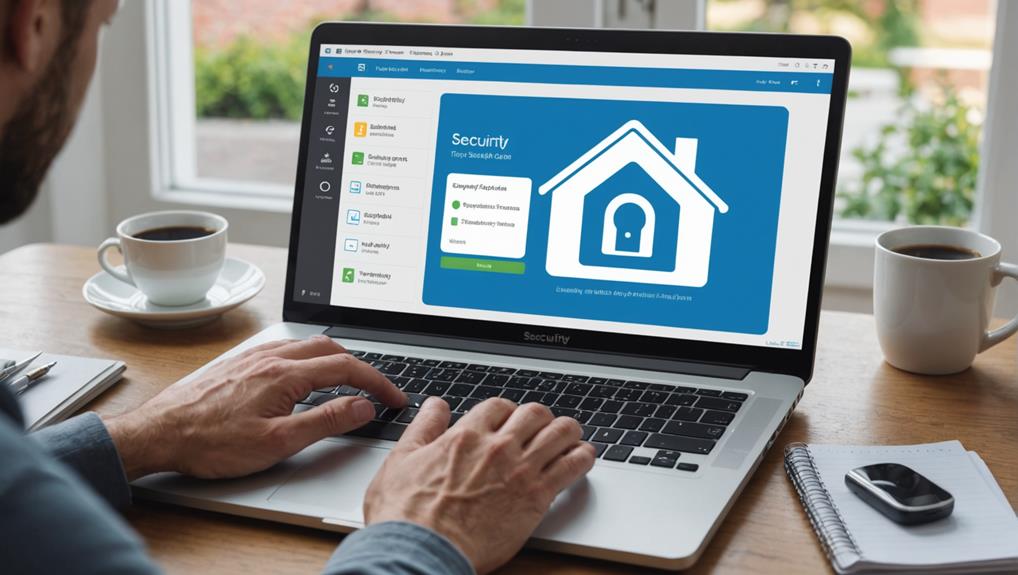
To maintain the ideal performance and security of your home security system, regular software updates and firmware upgrades are essential components. Here are some key steps to guarantee your system stays up to date and functioning at its best:
1. Automatic Updates: Systems connected to Wi-Fi often receive automatic firmware updates. However, it's advisable to manually check for software updates monthly to catch any that may have been missed.
Additionally, consider any ongoing costs, such as equipment updates, which might be necessary to keep the system fully functional.
2. Data Backup: Before applying any updates, make sure to backup your system configurations. This precaution can help prevent data loss and facilitate a smooth changeover between versions.
3. Enhanced Security: Keeping your software and firmware current is vital for addressing security vulnerabilities and reducing the risk of cyber threats. This proactive approach greatly enhances the overall security of your home.
4. Improved Functionality: Firmware updates play a critical role in maintaining hardware performance and guaranteeing that all components work seamlessly with the latest software improvements.
Professional Maintenance Benefits
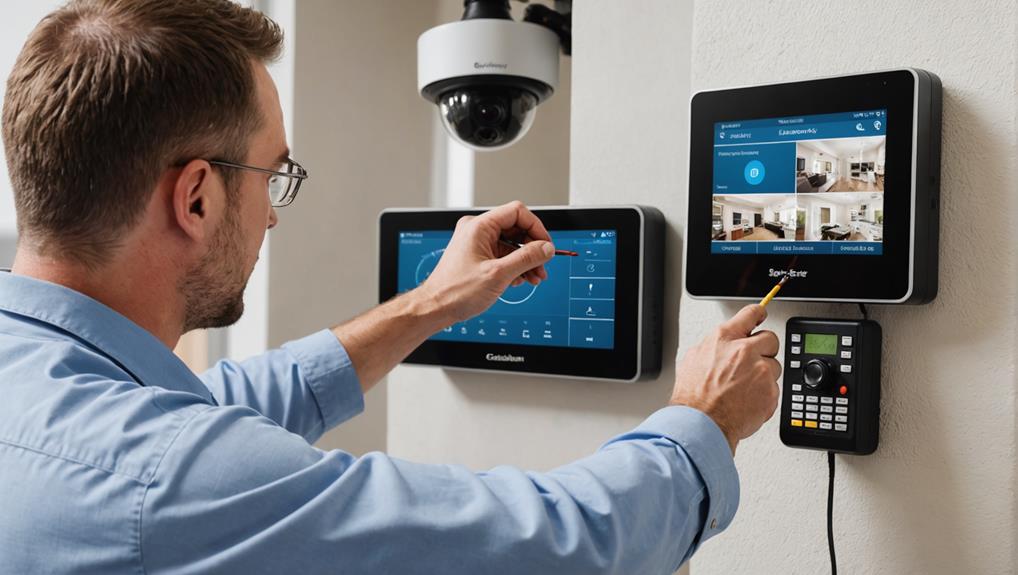
When it comes to maintaining your home security system, professional maintenance offers you expert evaluation benefits and technological upgrade recommendations that can enhance your system's overall effectiveness.
By having technicians conduct thorough system diagnostics, hidden issues can be identified and addressed promptly, improving the reliability of your security setup.
Additionally, receiving tailored recommendations for upgrades based on the latest technology trends can optimize your home protection, guaranteeing you stay ahead of potential security threats.
In some cases, professional installation of upgrades may be necessary to make sure that all components are correctly integrated.
This approach not only enhances your security system but also provides peace of mind knowing that it operates at peak performance.
Expert Evaluation Benefits
Choose professional maintenance to reap the full benefits of expert evaluations for your home security system. Through expert evaluations, you gain insights and enhancements that can greatly boost the effectiveness of your security setup.
Here are four key advantages of expert evaluation benefits:
- Thorough Diagnostics: Professionals conduct in-depth assessments to uncover any hidden issues within your system, ensuring peak functionality.
- Specialized Tools and Expertise: Technicians possess the necessary tools and knowledge to perform detailed inspections and repairs, surpassing what a DIY approach can achieve.
- Software Updates: Regular servicing includes essential software updates that fortify your system against vulnerabilities and improve its overall performance.
- Equipment Longevity: Annual evaluations help extend the lifespan of your security equipment by addressing wear and tear promptly, preventing costly repairs or replacements.
Technological Upgrade Recommendations
Benefit further from professional maintenance services by considering technological upgrade recommendations tailored to enhance your home security system's performance.
Professional technicians can offer insights into the latest security advancements and customize upgrades to meet your specific needs, maximizing the effectiveness of your system. By integrating smart home technologies like automation and remote monitoring, you can enjoy added convenience and improved system responsiveness.
Regular evaluations by professionals can pinpoint outdated components and suggest replacements that meet current security standards, guaranteeing your system operates at peak performance. Additionally, professionals verify that software and firmware updates are correctly applied, safeguarding against vulnerabilities and enhancing system functionalities.
Trusting experts for upgrades and maintenance not only extends the lifespan of your security system but also helps minimize long-term costs associated with equipment failures and replacements.
Invest in technological upgrades through professional maintenance services to keep your home security system at its best.
Offer Details and Restrictions
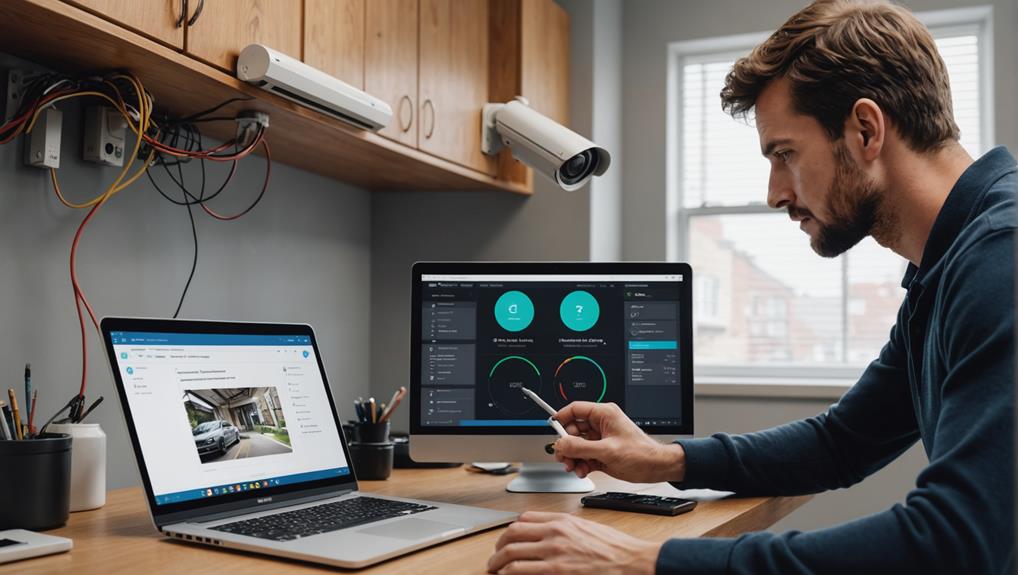
Curious about the details and restrictions of our current offer? Here's what you need to know:
- Eligibility: The offer is exclusively for new residential customers. A minimum equipment purchase is required to maintain eligibility.
- Participants: Only homeowners are eligible for this offer. Commercial and renter options are available through CPI.
- Installation Deadline: To qualify for the offer, the system must be installed by September 30, 2024.
- Activation Requirements: Credit approval and a monthly monitoring agreement are necessary to activate the service. Applicable sales and use tax will be added to the purchase total.
Remember, understanding home security system costs is essential before making a purchase.
Be sure to inquire about any potential additional fees or restrictions that may apply based on specific offers and local regulations.
This offer is designed to help you enhance your home security, so make sure to take advantage of it before the deadline.
Routine Testing and Inspections
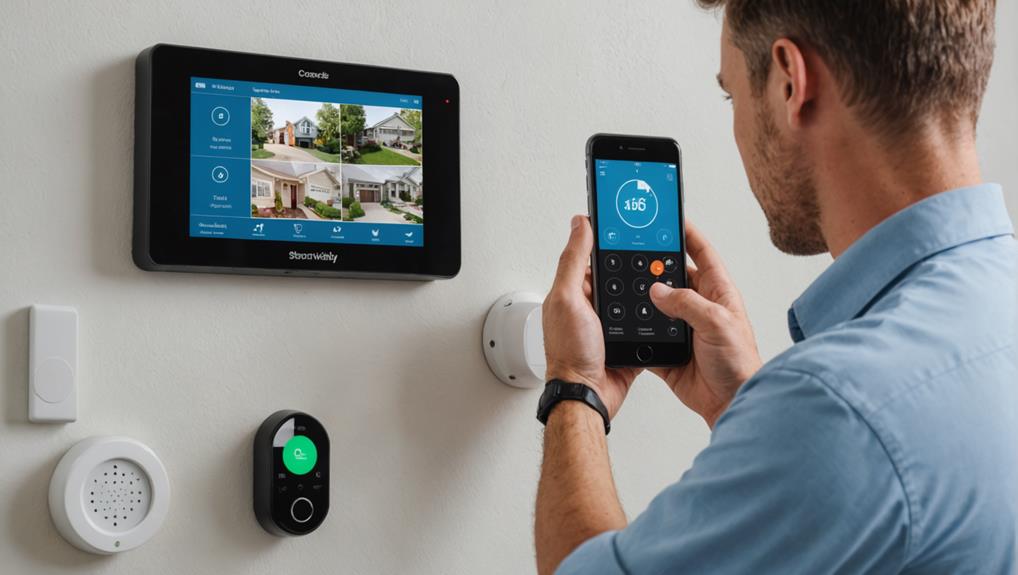
To effectively maintain the reliability and functionality of your home security system, regular testing and inspections are essential components of your security routine. Conduct monthly tests of alarm systems to verify all zones are monitored effectively, guaranteeing a swift response in emergencies.
It's also beneficial to familiarize yourself with the fundamental components of your system to understand how each part contributes to overall security. Quarterly inspections of sensors and cameras confirm their functionality and clarity, addressing any potential security vulnerabilities.
Remember to clean camera lenses regularly and check for obstructions to prevent false alarms. Document your findings from tests and inspections to track maintenance history and identify recurring issues that may need professional attention.
Establish a testing schedule that includes weekly battery checks to prevent low-power issues and verify all components remain operational.
Cleaning and Environmental Considerations
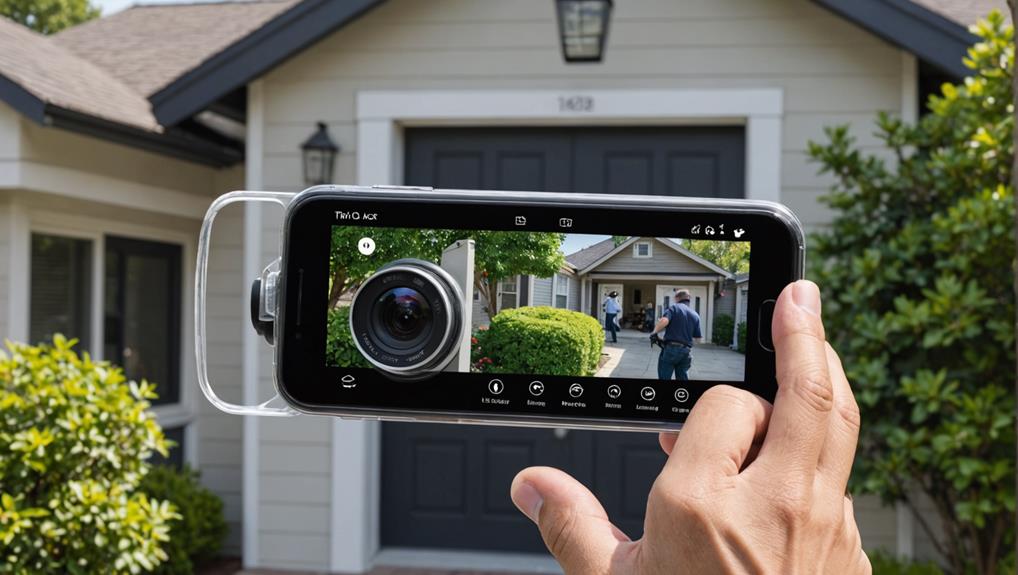
Regularly cleaning and maintaining your home security system is essential for guaranteeing its ideal functionality and longevity.
To keep your system in top condition, follow these tips:
1. Clean Camera Lenses and Sensors: Wipe away dust and debris that can hinder video quality and sensor performance.
Additionally, consider using lens cleaning solutions designed for optics to avoid scratching or damaging the lenses.
2. Inspect Outdoor Devices: Check for wear, adjust camera angles, and monitor motion zones for maximum coverage.
Make sure to also inspect for any environmental damage that could affect the performance of alarm and lock technologies.
3. Maintain Landscaping: Trim bushes and trees to enhance visibility and eliminate potential hiding spots for intruders.
4. Monitor and Clean Joints: Guarantee all parts move smoothly, contributing to the overall reliability of your security system.
Battery Maintenance and Replacement
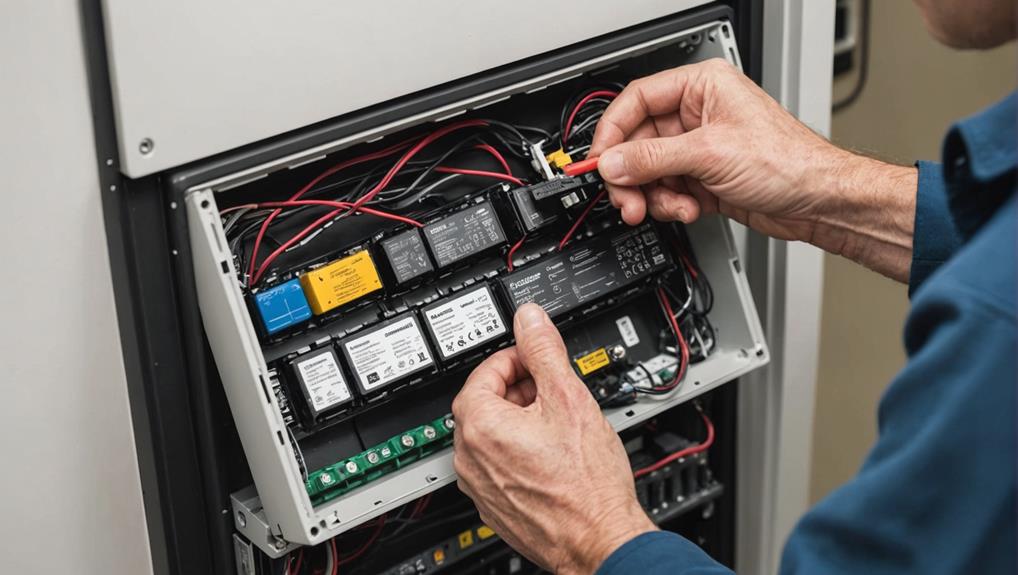
Guaranteeing the longevity and reliability of your home security system involves diligent battery maintenance and timely replacements. Regularly checking the battery levels of all security devices is vital, as alkaline batteries typically last 3-5 years, while lithium-ion batteries last 6-12 months. Replace low batteries immediately to prevent security system failures, and keep spare batteries on hand for quick replacements. Consult manufacturer manuals for specific replacement instructions to confirm compatibility and peak device performance. Schedule proactive battery replacements based on the average lifespan of the batteries used in your security devices to maintain uninterrupted functionality. Verify the functionality of backup power sources annually to make sure your security system remains operational during power outages.
| Battery Maintenance Tips | ||
|---|---|---|
| Check battery levels regularly | Replace low batteries promptly | Consult manufacturer manuals for instructions |
Troubleshooting Common Issues
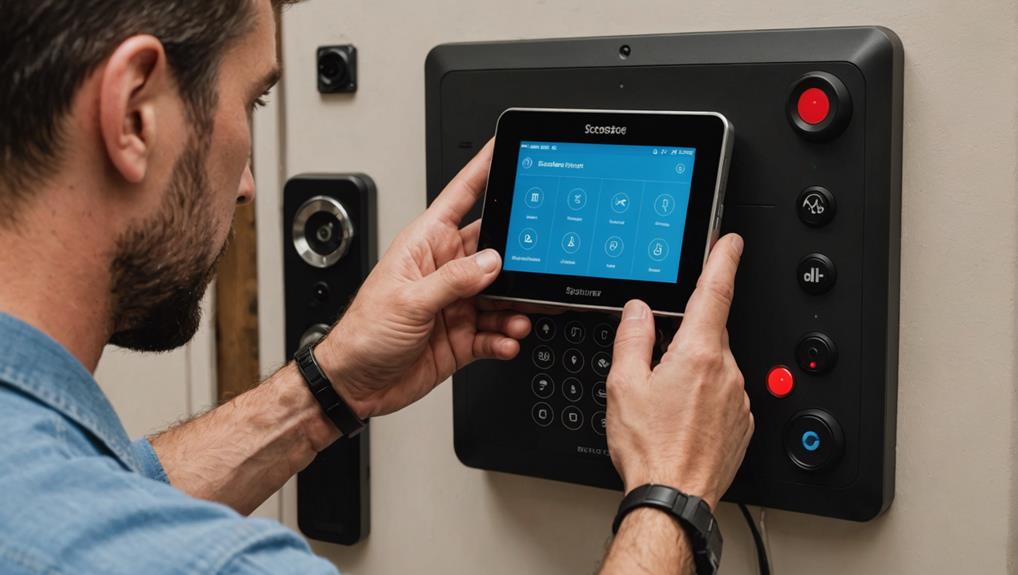
When troubleshooting common issues with your home security system, it's essential to promptly address any malfunctions to maintain ideal functionality and reliability. Here are some steps to help you troubleshoot common problems:
1. Check Sensor Functionality: Regularly inspect sensors to prevent false alarms and verify they're working correctly to avoid unnecessary emergency responses.
Confirm that wireless or wired sensors are appropriately installed according to your system's requirements.
2. Battery Maintenance: Replace batteries in all devices every three months to prevent system failures due to low battery levels that could compromise security.
Make sure to use high-quality batteries recommended by the manufacturer for peak performance.
3. Inspect Communication Errors: Examine the connections between components to verify seamless operation by confirming all devices are properly linked to the control panel.
4. Monitor Wiring Condition: Keep an eye out for any signs of wiring damage such as frayed or improperly connected wires, as these issues can lead to system malfunctions or failures.
Frequently Asked Questions
How Often Should I Replace My Security System Batteries?
You should replace your security system batteries every 3 to 5 years to guarantee they're working efficiently.
Regularly replacing the batteries will help maintain the ideal performance of your security system and provide you with peace of mind knowing that your home is secure.
Can I Install Additional Sensors or Cameras Myself?
You can definitely install additional sensors or cameras yourself to enhance your home security system.
It's a simple process that can expand your system's coverage and effectiveness. Just make sure you follow the manufacturer's guidelines and instructions carefully.
By adding more sensors or cameras strategically, you can better safeguard your property and loved ones.
Remember to test the new components after installation to confirm they're functioning correctly.
What Should I Do if My Software Update Fails?
If your software update fails, try restarting your system first.
If that doesn't work, reach out to your security system provider for assistance. They can walk you through troubleshooting steps or provide guidance on next steps.
Don't worry, they're there to help you resolve any issues and guarantee your system is up and running smoothly.
Are There Specific Cleaning Products Recommended for Cameras?
To keep your cameras in top shape, opt for gentle cleaning solutions like a mild detergent mixed with water.
Avoid harsh chemicals that could damage the lenses or casing.
A soft cloth should be used to wipe down the camera exterior.
How Can I Prevent False Alarms Due to Environmental Factors?
To prevent false alarms from environmental factors, make certain your sensors are free from obstructions like cobwebs or debris.
Adjust the sensitivity settings to minimize triggers from pets or moving objects.
Regularly check for loose connections and replace batteries as needed.
Finally, keep your system up-to-date with the latest software updates to improve its accuracy.
Conclusion
Remember, regular maintenance is key to keeping your home security system running smoothly and effectively. By staying on top of software updates, routine testing, and battery maintenance, you can guarantee that your system is always ready to protect your home and loved ones. Don't wait until it's too late – take proactive steps to maintain your security system for peak performance.




